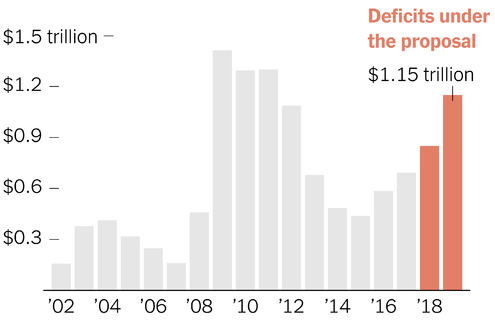The bill expands pilot programs meant to test the value of in-home care for some Medicare patients. And it expands the ability of private Medicare Advantage plans to offer so-called “telehealth,” where doctors treat patients over the phone or internet. It would allow Medicare providers who are part of an accountable care association to offer patients cash bonuses as incentives for healthy behaviors.
The bill increases discounts that pharmaceutical companies must give seniors enrolled in the Medicare Part D drug plans, by making the so-called “doughnut hole” smaller. This was a policy that was part of the Affordable Care Act, but the new legislation would speed up implementation by one year.
Funding changes for public health programs.
The spending plan would cut $1.35 billion in funding to an Affordable Care Act program meant to improve public health and prevention funding for states and municipalities.
Another extension for the Children’s Health Insurance Program.
It would extend funding for the Children’s Health Insurance Program for an additional four years. Last month’s spending bill had already extended the program for six years, so now CHIP will be funded for an entire decade. Another popular program that delivers health care to low income children and adults, the government-funded clinics known as Community Health Centers, will also get a two-year funding extension.
Graphic
Budget Deficits Would Balloon Under the Bipartisan Spending Deal
The two-year budget agreement reached by Senate leaders would contribute hundreds of billions of dollars to federal deficits.

Continued funding for abstinence education.
The bill would extend funding to abstinence-only sex education programs.
A break for Berea College.
The spending bill restores a provision that was stripped out of last year’s $1.5 trillion tax bill after the Senate parliamentarian objected to its inclusion.
Newsletter Sign Up
Continue reading the main story
Thank you for subscribing.
An error has occurred. Please try again later.
You are already subscribed to this email.
The bill would exempt Berea College, a small private college in Kentucky that provides free tuition, from being subject to a new tax on large higher education endowments that was included in last year’s tax law.
The bill adds language that makes the new excise tax on investment income applicable only to schools with “tuition-paying” students, shielding Berea College, which does not charge tuition. The school is in the home state of Senator Mitch McConnell, the majority leader.
Tax breaks for racetracks and horse owners continue.
Owners of race horses and motor sports entertainment complexes would get an extension of special tax treatment. Horse owners are allowed to depreciate their horses over the course of three years. For racetracks, the depreciation is over the course of seven years. Those breaks would remain in place for 2017.
Advertisement
Continue reading the main story
Extension and expansion of energy tax credits.
The Senate bill features a multitude of tax breaks for renewable energy sources that had been neglected in a 2015 deal to bolster wind and solar power. These so-called “orphaned” technologies include geothermal, small wind farms and fuel cells. Much like existing credits for wind and solar power, these incentives would phase out starting in 2020.
The bill also extends an existing production tax credit for nuclear power past 2020, which would benefit a pair of long-delayed reactors being built in Georgia that aren’t expected to come online before 2021. Southern Company has said it may not be able to complete the reactors, the only two still under construction in the United States, without the credit.
A separate measure would greatly expand a tax credit for companies that capture carbon dioxide from power plants or other polluting facilities and pump it underground. Oil firms such as Occidental Petroleum have been pumping captured CO2 into old wells in order to extract additional oil. Some environmental groups also lobbied for the measure, arguing that carbon capture technology, still in its infancy, could one day prove a crucial tool for tackling climate change.
The bill retroactively extends tax credits for biodiesel, advanced biofuels and fuel-cell vehicles through the end of 2017. Industry lobbyists had unsuccessfully fought to get many of these measures included in the tax overhaul bill passed by Congress in December. They could still face resistance in the House.
A tax credit for mining safety.
The bill extends a tax credit for 20 percent of an employers’ spending on mine rescue team training costs, up to $10,000. A separate provision allows the immediate deduction of a company’s investment in mine safety equipment.
A special rate for timber sales.
The bill continues a special tax rate of 23.8 percent for 2017 for gains from timber sales, a break from the top rate of 35 percent that would have otherwise applied.
Continue reading the main story
Article source: https://www.nytimes.com/2018/02/08/us/politics/senate-spending-bill-taxes-medicare.html?partner=rss&emc=rss
Speak Your Mind
You must be logged in to post a comment.